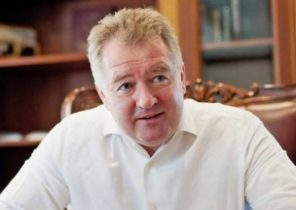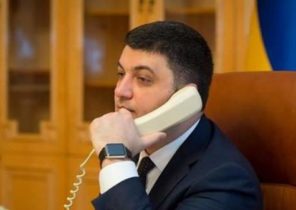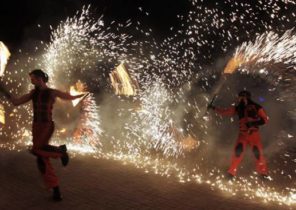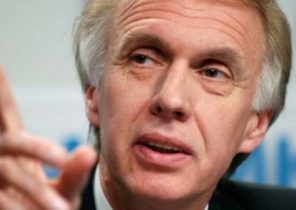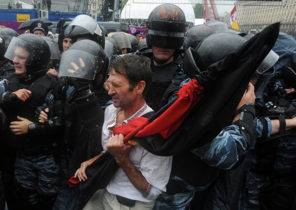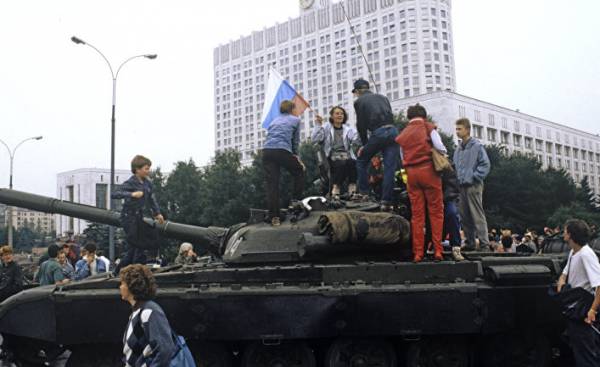
Russia is distinguished by the unpredictability and tendencies of society in one way or the other visible, but at any moment they may crumble to dust, says the famous Russian writer Roman Senchin. According to him, he writes about the difficult life of the people, because of the simple write is not necessary.
Roman Senchin is the author of the novels “Minus”, “Nubuck”, “Eltahawy”, “Information”, collections of short stories “Idim”, “number”, “Absolute solo” etc. In 2009, the novel “Eltahawy” — the story of one family in a period of great change in the history of Russia after the collapse of the USSR, was included in short-lists of major Russian literary awards “the Big book”, “Russian Booker”, “Yasnaya Polyana”, “national bestseller” and got a lot of critical reviews. In 2011, this novel was included in the shortlist prize “Russian Booker of the decade”. In 2015, the novel Senchina “flood Zone” received the third prize “Big book”.
According to the writer, literature in Russia must comprehend the nineties of the last century that has not yet happened. Senchin, by his own admission, afraid of history, however, argues that the current leadership is constantly offering to look back, however, a clear idea of present-day Russia does not offer. “Russia is now an authoritarian, but Putin is not eternal, and that there will be after him — is very vague. It is a cold, disturbing the mist…” — he says.
“It was the late’ 80s and all the 90s — it was a very difficult time”
Delfi: History Eltysheva in your book is a story about the tragedy of the people of a whole generation. Many after the collapse of the USSR was out of work, are unable to navigate in the new reality, the values that they lived before, collapsed while adapting to new concepts of life, many failed, people had just to survive. Don’t you think that the people who are in the Prime of his life, which came on the period of the collapse of the Soviet Union, went through very difficult times and about them in General, as well as their lives, said and said very little?
Roman Senchin: Not only think, but it was the late ‘ 80s and all the 90s- was a very difficult time. Many are unable to survive, died, died from the stress, worries… For some, those hard times are still continuing… it Says really little, though kept going back to that period is impossible, we need to move forward. However, fiction is obliged to reflect the 90-ies. While basically this period was highlighted by authors of crime novels, fighters. I think the works of serious, deep still appear. And they appear, albeit in small quantities.
— What, in your opinion, at the moment is the feature of life of the average Russian or the potential for you a prototype of the hero of the book? Why did you choose the subject descriptions of the ordinariness of life?
— Well, what is the feature of… For most, the main thing — to survive. Many work on unloved work, doing my thing, not like for the money. In Russia, unfortunately, still little is produced, so there are a huge number of intermediary organizations that pass each other, put simply, the Chinese Slippers on the way from the sewing factory to the store… this aimless, in General, existence, for many people, the longing, the yearning… I Want something real. And I’m trying to show the mood in his books. And the ordinariness of… Life in General consists mainly of routine. Something out of the ordinary, some adventures are rare. So, I wonder so-called ordinary, small things, problems… Although “Eltysheva”, “flood Zone”, some of my other things of everyday life not so much.
— In one interview you said you’re looking for extraordinary in the ordinary. What is extraordinary in everyday life of the Russians you see today?
— It’s not the Russians. In fact, any person of European civilization the day is going the same way. Look at this day through prose interesting to me and important. In fact, every day something extraordinary. Even the most bland, colorless. He’s not coming back, not again… I have been to many countries of Europe, but briefly, superficially. I live in Russia and write about it, about people who live in it.
— In the “flood Zone” you write about a Siberian village, the relations between government and people. Now what in your opinion is an indicator of such a relationship? As the current Russian government sees as being used their loved ones or as a kind of impersonal machine?
— Pro features unable to talk — as said above, other countries practically don’t know… the State in Russia for a long time, since the days of Ancient Russia sought to conquer every person living in the state borders. Why so many in Russia has always been those who sought to get away from the capital, to live secluded for himself. To this was added the religious aspects. Remember the old believers, doukhobors who left Russia many thousands… But in the years of Soviet rule, the borders were closed, almost all were considered, all the cloaks, useful for the state. In 1992, the Russians announced — you are free, do what you want. It was a tragedy for the people. Russian, at least, and many other Nations have forgotten how to be without the guardianship of the state, without his carrot and stick. Therefore, do not get us any co-operative movement, no farming or small business.
Strengthening the “new” Russia as a state began under Yeltsin realized that Russia could fall just as the Soviet Union collapsed. The strengthening consisted of including social guarantees for people. Putin this policy develops, and this explains its great popularity. Although we still live in that stage of capitalism when the state can not be strong. Must pass or even a hundred years, or need to take a lot of the socialist system that, in General, made many European countries.
— You associate with the “new realism”. There are “metaphysical realism” Yuri Mamleeva. These two of realism can be overlap?
— Any direction, literary, artistic, even philosophical in many respects the Convention. New realism came as the force tending to push the field of literary postmodernism, conceptualism and other other currents that were dominant in 90 years… a generation of young people who wanted accurate form — in the form of realism — to tell about his life, life of close people, about events, witnesses or parties to which they have become. With more than traditional realism, especially social realism, freedom. This generation and ushered in a new realism… What is metaphysical realism, I difficult to explain. But they are overlapping. They are everywhere in all denominations. And what is it — let the literary critics, linguists.
— Can we say that the works that touch on topical issues of everyday, ordinary life of modern Russia find a wide response from the reader?
— Wide response, I do not see, not hear. Still far more reader interest books, fiction, romance, detectives, fighters… But there are those who read about modern life. They are gradually getting bigger. It pleases.
— Sibir loved the world. Than Siberia different from the rest of Russia? What do lives of the Russian periphery, as they call everything outside of Moscow? And why, in your opinion, in jest or in all seriousness in the public space the idea of transferring the capital of Russia in Siberia?
I can’t list the differences of Siberians from other Russians. And the point here is, rather, not in others, and in the ground. In the geography. Each region of Russia has an impact on those who live there, who visit it for a long time. Siberian or Ural, or northerner, moving to Moscow, sooner or later become Muscovites — Moscow subdues them to himself… all cities are an anomaly in human civilization. The city in Russian literature almost always is the enemy of man, life, morality… I am also a supporter of the capital — the administrative capital — to carry from place to place. Ten years, for example, in Tomsk, ten years in Khabarovsk, then Bryansk or Kursk… Moscow let it be spiritual capital, and the government, the Parliament may be moved. May be, and will live ascetic than now.
“And we dutifully look”
— Recent study of the Committee of civil initiatives Alexei Kudrin pointed out that the Russians perceive the past as two parallel stories. One story is a conservative myth that imposed by the state, which cannot prevent the formation of an alternative memory based on the study of real history of their families and small homelands. In terms of relationship to the past you could allocate the important?
— I’m afraid of history. Once in his youth seriously was engaged in it, but realized that they’re mixed, every historian, of a witness has their own point of view, for each source there is contristari that threw. I myself write mostly about what is happening now. Try to transfer in prose still pulsing event, appreciated by historians. The slogan — “we need to deal with their past in order to move on” — I do not support. No one will ever understand. Russia is mired in history, confused, stalled. However, like many other countries… we Have it, it seems, comes to the extremes: Ivan the terrible or the 28 Panfilov able to paralyze the entire thinking part of the Russians. But as Russia to live tomorrow, what will happen when President Putin will go — is unclear. No clear ideas, no program. The current administration says: trust us and everything will be if not fine, then fine. And constantly offers look back: look how bad it was before, what turmoil was happening… And we dutifully look. And thus miss the nuances of the current time.
— Happened in Russia, awareness of their own Soviet, a recent and ongoing history?
As I notice, still the majority of Russians perceived the October revolution as a great event. But that’s the way to build socialism, there are many different points of view, irreconcilable positions. Most, including myself, still recall with horror the 90 years — a terrible, disastrous time for Russia. Hence the nostalgia for the Brezhnev era, the tolerance of what was happening in the 00’s and is happening now… About the awareness of hard to say. Still many live today. Struggle for existence. Now for many people the existence of relatively good, even though business leaders in private conversations agree that capitalism is not the best form of social organization. There are those who support the socialist and leftist currents.
— Each country has its own myths. Do the Russian leadership to build benchmarks for its citizens? And if so, how do you assess them?
— Something is built, but strangely and randomly. I can’t answer this question. Now more and more attention is drawn to Orthodoxy, there is the myth that Orthodoxy was the basis for the creation of Russia. I do not know. Any serious historian can oppose a lot of facts. And indeed Christianity and the state is mutually exclusive forms. But the government since the days of the Roman Empire and the Byzantine Empire was set up under Christianity and adjusted itself, and for most believers, this became a reality… Landmarks lined up, but I can’t explain and evaluate. This is a topic for a novel, not an interview.
— International non-governmental organizations, private and public policy activities accuse Russia of violations of freedom of speech. I want to ask you as a writer — does Russia have freedom of speech?
— In fiction — absolute. If there was some attempt to blame a writer for his book (mainly, pornography, drugs), it ended for the most part nothing. But in the difficult situation of publishers. Although bold books leaves many… On the media was not significantly I can say — personally my articles, even very sharp, printed and published. No persecution, I did not feel. With the television I don’t know… a Huge number of Russians access the Internet, and there you can find anything you want and also to write whatever I want. There are scandals and even the courts, but this is really really really extremist texts. In Europe this happens. However, the list of extremist literature we have all long, and it’s unsettling… But, you know, I am a person who writes prose, short stories, novels, and to me, honestly, it’s all good: freedom and entrapment, and even bans. Because anything can become material for a book. In the absolute freedom of any art withers. Besides, I think that the book is prose, this is a potentially very strong instrument. If I didn’t think would be a politician or a journalist, human rights activist…
— The events in Ukraine largely held a kind of watershed between all sectors of society. How does it impact on the literary environment, and in General the atmosphere in the field of culture? Because of the disagreement with the policy of the government leaving the country, including well-known writers, Directors, actors. What do you think about this?
— Yes, the events in Ukraine, if not split, then seriously rastrelyali society. I also spoke on this subject by journalism, but when, in my opinion, something you can correct — at the end of 2013 to the first half of 2014. Then wrote what I felt was a biased story called “Help” (the magazine “Znamya”, 2015, №5 and the book “cross country”), which I then often ask, “is It a pamphlet or a Eulogy?” Prose is always deeper journalism — it even against the author’s will look wider… Me in the events in Ukraine and with Ukraine the hardest care about the future of Russia. It is clear that the so-called international community of Crimea Russia will not forget and will not forgive, the conflict in the Donbas for decades. Russia is authoritarian, but Putin is not eternal, and that there will be after him — is very vague. It’s a cold, unsettling fog…
About writers… to Leave the country because of disagreement with policy of the authorities, this kind of deceit. These writers are not going the way left, for example, Aksenov, Voinovich, Viktor Nekrasov, they are not expelled as Alexander Solzhenitsyn… Akunin, Ulitskaya often in Russia, the books they published. But they are positioning themselves to certain political emigrants. This, of course, wrong. Maybe it’s some excuse that they have chosen to live in Europe. As Vysotsky sang: “There they have what’s best domestic”. The policy of the authorities here at anything. Rather, it is a reason to not live here.
While many politicians, economists, journalists, social activists leaving due to the danger to be imprisoned. There are many people in other countries. Any, even the most liberal state, fights with dissidents. It is a vain struggle — the dissenters in any case be the winners, and the courts, even prison term to go to them.
Unpredictable Russia
— What tendencies in public consciousness of Russians you could mention? In what direction is modern Russian society? What defines a movement?
— What is interesting about Russia is that it is unpredictable, that it cannot be measured by a common yardstick, as noted once Tyutchev. The trend seems to be visible, but at any moment they may crumble to dust. People may turn in a different direction. Look at Russia in 2011, when a huge number of people were against Putin and his entourage, and in 2014, almost all for Putin and the same (mostly). After two or three years, there may well be a new turn of 180 degrees… Russian people and many other peoples of Russia I love anything to hope in something to believe in. Hope and trust can take quite a while, and then explode the famous Russian revolt…
— What is the main, in your opinion, as a writer, the view, the problem of modern Russia?
— The main problem of modern Russia to determine not solved. The more that this problem is not modern Russia, but some a long, maybe eternal. On finding her fought the great philosophers, writers, politicians… But with my problem or many problems Russia exists as a state for quite a long time in the scale of world history…
Siberia gave Russia a powerful layer in terms of music, punk rock. You are also no stranger to music, and doing it. Is there something similar to that movement that we observed in the decline of the USSR and the early years of the new Russia?
— About rock music. I still listen to those groups, which have grown, “Aquarium”, “Zoo”, “Cinema”, “Alice”, “Civil defense”, “instructions for survival”… He was involved in rock bands… But it’s for temporarily or permanently goes down in history. Now, the rock, at least in the social, existential terms — REP. But as music I’m not interested in rap… Music is essential to society. Now, after the recent on the historical scale of the changes and upheavals of the 90-ies of the people want peace, simplify, so it is popular pop.
— After reading your books you have the feeling of a hard existence, where no man in Russia is independent. You think so?
— Where is depends? In my opinion, the everywhere man — a grain of sand, which are driven by the winds of circumstances, scoring in a gap, which is called social housing. The existence of my characters is not easy, but simple and not worth writing… Judging by modern (I will not go into the count of time) literature, the cinema of many other countries, everywhere people are not very good and cozy.
— Did you have you suggestions about the translation into the Lithuanian language? And what are your plans now, what are you working on?
In Lithuania I visited last year, brought with him several books, which quickly dismantled came to the meeting. Judging by the questions, the interest in modern Russian and my prose is great. Proposals for the transfer was not… Write short stories and small novels, slowly moving large thing about — roughly speaking — the problem of the narrowing of the Russian world in Russia. But the details in advance will not. Everything may not work out as originally intended.


